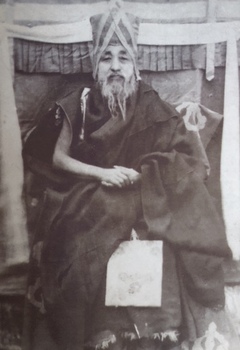Advice on Remembering Parents
Advice on Remembering One’s Parents
by Öntö Khyenrab Chökyi Özer
At first, your parents are kindest for giving you human form.
Then, the guru is kindest for presenting the divine Dharma.
Ultimately, you must show yourself the greatest kindness,
So always devote your body, speech and mind to Dharma.
If you remember your parents, exert yourself in Dharma.
All who take birth must by their nature come to die.
All meeting must inevitably end in separation.
And at death nothing but Dharma is of any benefit.
If you remember your parents, try to repay their kindness right away.
Teach them to adopt virtue, avoid harm, and set out upon the path.
Whatever virtues you have accumulated, dedicate them all to them,
Because you cannot repay their kindness with anything but Dharma.
If you remember your parents, avoid non-dharmic actions.
Trading and farming are unfit for those who've renounced household life.
In bustling distraction you’ll fail to accomplish your own and others’ aims.
And there’s nothing worse in this world than one who's reckless and rash.
If you remember your parents, stay relaxedly at home.
Too much travel brings all manner of distraction.
Too much talk sets the whole world against you.
Having many plans leads to nothing but failure and ruin.
If you remember your parents, regard everyone as a mother or father,
Friends and allies are your parents; bitter enemies are your parents too.
The guru is your parent, and your dharma friends are parents as well.
There's not a single living being who's not been your mother or father.
If you remember your parents but fail to recognize their kindness,
Then exert yourself in the study of the texts of learned scholars,
And receive profound instructions, the words of sublime teachers.
Or else a hundred years might pass and still you would not know.
If you remember your parents, always be conscientious.
All virtuous practice derives from conscientiousness.
And without such care you'll repay kindness wrongly.
There’s nothing worse in this world than an insensitive fool.
If you remember your parents, lasso them with compassion.
Receive the profound secret mantra with the mind of awakening,
Let the nectar of sacred Dharma heal the blow of self-clinging,
And you’ll have no regrets about failing to repay kindnesses.
If you remember your parents, lift your head through study and reflection.
With dedicated application, tighten the belt of method and wisdom.
Leave the house of self-based views behind and flee to the plains of selflessness.
Even if the fields beyond saṃsāra are empty, you’ll have no regrets.
If you remember your parents, seek the solitude of the mountains.
Cultivate the four boundless emotions for your parents among the six classes.
Let the child be captivated by the heroic father-guru’s life of liberation,
And never be apart from the mother-goddess of blissful clarity.
If you remember your parents, train in the mind of awakening,
And meditate constantly on the path of two profound stages.
When realization eventually manifests,
You’ll never lack profound means and wisdom.
If you remember your parents, look into your own mind.
Your father is clarity, your mother the nature of emptiness.
Inexpressible emptiness-clarity is mind’s basic character.
From this indivisible clarity and emptiness, there is no separation.
Ha! Ha! It is the father and it is also the mother.
It’s one, indivisible, and yet is divided into two.
When you think about this and how flexible it is,
How funny that all phenomena are just the same!
When applying the sevenfold reasoning of the chariot,
Clinging to parents as real dissolves into limitless space.
Beyond expression, the child takes the great empty path.
And in basic space, beyond mind, there’s no father or mother.
In reply to Lodrö Namgyal, a monk from Dungdo, who said that he sometimes feels sadness and regret when remembering his parents and that he needed some brief advice on how to deal with this, Lodrö Lekshé Gyatso playfully wrote down whatever came to mind.
| Translated by Adam Pearcey, 2020.
Bibliography
Tibetan Edition
mkhyen rab chos kyi 'od zer. "pha ma dran pa'i zhal gdams". In dbon stod mkhyen rab chos kyi 'od zer gyi gsung 'bum. Bod ljongs bod yig dpe rnying dpe skrun khang. 2015 pp. 96–97
Version: 1.1-20210621
